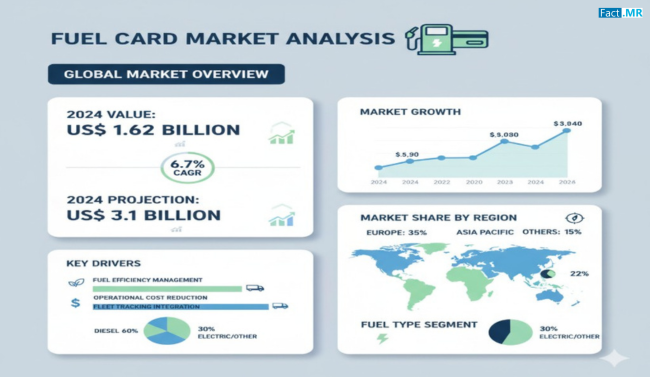Fuel cards have become an essential tool for businesses managing vehicle fleets, providing a secure and efficient way to pay for fuel, monitor expenses, and streamline fleet operations. With businesses increasingly focusing on operational efficiency and cost control, the fuel card market is experiencing rapid growth. This trend highlights the importance of digital payment solutions and advanced fleet management tools in modern transportation.
Market Overview:
Fuel cards, also known as fleet cards, are payment solutions issued by banks, fuel companies, or financial institutions. These cards allow businesses to manage fuel and maintenance expenses for their fleets while providing real-time tracking and reporting capabilities. Fuel cards offer convenience, reduce administrative burden, and provide businesses with better control over spending. They also help improve fuel efficiency and ensure compliance with financial and regulatory standards.
Regional Insights:
North America is a leading adopter of fuel card solutions, driven by large-scale fleet operations and the demand for efficient expense management. Europe follows closely, with countries emphasizing technological adoption and sustainability practices in fleet management. Asia-Pacific is emerging as a key market due to rapid industrialization, growing vehicle fleets, and the adoption of digital payment systems, particularly in countries such as Japan, South Korea, and China.
Key Trends & Forecast:
- Digitalization and Mobile Integration:Fuel card providers are increasingly offering mobile applications for monitoring fuel usage, making payments, and generating reports.
- Contactless Payments:Modern fuel cards support contactless payments, streamlining transactions and enhancing convenience and hygiene.
- Real-Time Tracking and Analytics:Integration of GPS and AI-driven analytics allows businesses to track vehicle location, fuel consumption, and optimize operational efficiency.
- Sustainability Focus:Fleet operators are leveraging fuel cards to monitor fuel usage and support eco-friendly initiatives.
- Strategic Partnerships:Collaboration with fuel station networks ensures broad accessibility and potential discounts or loyalty benefits for businesses.
Applications & End-Use Outlook:
Fuel cards are widely used across multiple industries, primarily where vehicle fleets play a crucial role:
- Logistics & Transportation:Enables centralized management of fuel expenses for trucking and delivery fleets.
- Construction & Infrastructure:Helps monitor fuel use for heavy machinery and vehicles in remote locations.
- Corporate Fleets:Provides convenient payment solutions for company cars and employee travel programs.
- Public Services & Government Vehicles:Facilitates cost control and reporting for municipal and governmental fleets.
The demand for fuel cards is rising as companies look to optimize operational costs, improve accountability, and adopt automated expense management solutions.
Competitive Landscape:
The fuel card market is composed of established global players and emerging fintech companies. Key market strategies include:
- Expanding networks of fuel stations to improve card acceptance.
- Incorporating AI-driven analytics and real-time monitoring for fleet optimization.
- Developing mobile and web applications for enhanced user experience.
- Offering loyalty programs, discounts, and cost-effective solutions to attract new clients.
Major players include FleetCor Technologies, WEX Inc., Voyager Fleet Card, Eurowag, ExxonMobil, Royal Dutch Shell, Total S.A., Repsol, Marathon Petroleum Corporation, and Edenred, among others.
Key Takeaways of the Report:
- Fuel cards simplify fleet expense management and provide centralized control over fuel consumption.
- Increasing digital adoption and mobile integration are transforming fleet management solutions.
- Real-time tracking and AI analytics are enhancing operational efficiency and decision-making.
- Asia-Pacific is emerging as a fast-growing market due to industrial expansion and fleet growth.
- Strategic partnerships with fuel stations and eco-friendly initiatives are key trends shaping the market.
Market Drivers and Key Trends:
The fuel card market is driven by the need for operational efficiency, cost control, and transparency in fleet operations. Businesses are increasingly adopting digital payment solutions to simplify reporting, prevent unauthorized expenses, and ensure compliance with fuel usage regulations. Advancements in technology, such as mobile apps, contactless payments, and AI-driven insights, are further accelerating market growth. Additionally, a focus on sustainability and reducing carbon footprints is encouraging companies to monitor and optimize fuel consumption more effectively.
Company Profile:
Leading fuel card providers are focusing on innovation, technology integration, and expanding service networks. Companies are offering advanced mobile applications, real-time monitoring, and loyalty programs to maintain competitive advantage. Start-ups in this space are leveraging AI, mobile platforms, and strategic partnerships to create value-added services for fleet operators. These initiatives enhance operational efficiency, reduce costs, and improve user experience, positioning these companies as key players in the growing fuel card ecosystem.
Conclusion:
The fuel card market is set to expand as businesses increasingly rely on efficient, digital, and secure methods to manage vehicle fleet expenses. With technological advancements, real-time monitoring, and strategic partnerships, fuel cards are enabling companies to optimize operations, reduce costs, and improve fleet performance. Adopting fuel card solutions is no longer just a financial convenience—it is a strategic tool for operational excellence and sustainability in fleet management.
Browse Full Report – https://www.factmr.com/report/265/fuel-card-market



